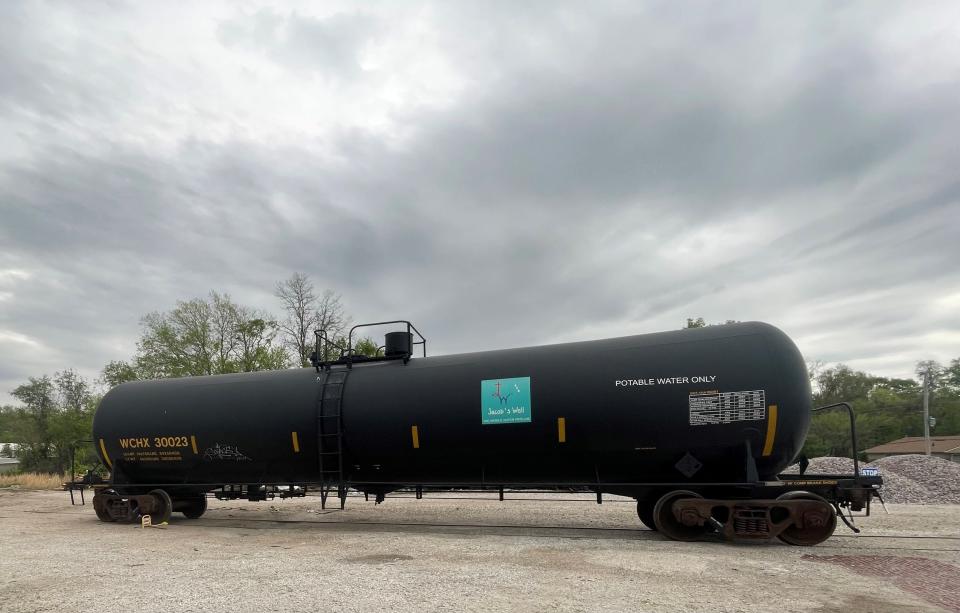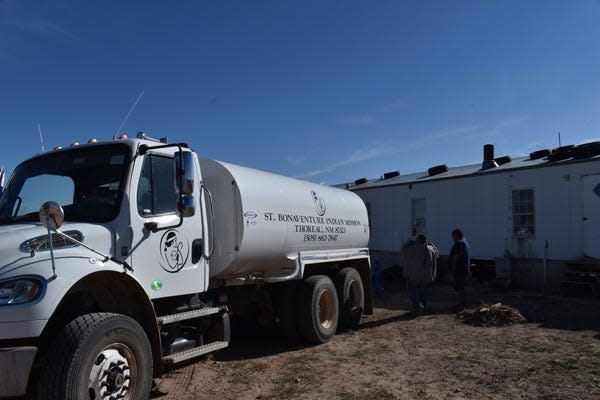A railroad worker figured out how to send thousands of gallons of drinking water by rail from Mississippi to the Navajo Nation to alleviate the water crisis
Andrew Halter delivers water 1,200 miles by rail from Mississippi to the Navajo Nation.
Navajo Nation residents have been struggling with water scarcity, with 30% lacking reliable drinking water.
Halter hopes water-by-rail can be a solution for other Western communities and in natural disasters.
Andrew Halter had been in the railroad business for 25 years, mostly in middle-management roles. It was his dream job and all he ever wanted to do.
But when the world shut down in 2020 and he got laid off, he needed to figure something else out.
"It came to me one day like a clap of thunder," Halter, who lives in Pennsylvania, told Business Insider.
Halter and his brother had long talked about the possibility of using rail to help alleviate the water crisis in the Navajo Nation. His brother, Chris Halter, runs the St. Bonaventure Indian Mission and School on the southeastern edge of the reservation, which spans more than 27,000 square miles across parts of Arizona, New Mexico, and Utah.
Nearly a third of Navajo Nation residents don't have access to reliable, clean drinking water, according to the tribe. The estimated population was more than 165,000 in 2020, according to census data.
The mission was already delivering water via trucks to 250 families, a small portion of the Navajo who are water-scarce. The families receive about 40 gallons of water a day, far less than the 300 gallons the average American family uses. The mission has relied on a local well to get the water, but if something happened to it, all those families would be without any water virtually overnight.
"To be honest, it was always the thing that would wake me up in the middle of the night," Chris Halter told BI. "If that well shuts down for some reason, what would I do next?"
Now, Halter's company, Jacob's Well, delivers thousands of gallons of water each month from Mississippi to the Navajo Nation via the BNSF Railway in partnership with the mission. The water-by-rail served as a lifeline in 2022 when the well had to undergo repairs that lasted months.
The operation has grown quickly, and Halter is focused on expanding to provide more water to both the Navajo Nation and other places in the West, where dried-up rivers and reservoirs are leaving communities increasingly desperate for solutions.

Some thought the water-by-rail idea was crazy
When Halter first started calling railroads about transporting drinkable water, some thought the idea was crazy.
He finally got in touch with BNSF's Eunice Sun, who's the business-development manager of emerging markets.
"We haven't moved potable water prior to this opportunity, really, because the economics don't necessarily pencil out in order to pay for that water and pay for the transport," Sun told BI. But when Halter came to her, she said, he did a great job communicating his vision and business plan.
Halter said that depending on fuel prices and other fluctuating costs, water could be transported for about 38 cents a gallon right now. Those costs are covered almost entirely by private donations to the mission. As the operation scales up and he transports more tank cars of water, those costs could come down.
Getting a public utility to sell him hundreds of thousands of gallons of water a month was another story. "A lot of times, they think you're crazy," Halter said. Still, he was able to work out a deal with the water department of Helena, Mississippi, where Jacob's Well collects its water before it travels 1,200 miles by rail to the southwest.
Once it arrives, the Navajo families can pick up water from the mission or have it delivered to their homes, just as the well water is.
Halter said that originally, he couldn't even find information about how the water would travel, and it took a lot of testing before and after transport to ensure the supply stayed safe to drink.
"We've kind of had to wing it and make up our own rules as we go along and figure some things out the hard way, which we did," he said.
It took about eight months from when Halter first contacted BNSF for the first shipment to go out, and the operation has only grown since. Halter said that the operation was now averaging about two tank cars a month, each holding 21,000 gallons of water, but that it was capable of delivering 200,000 gallons a month if needed.
It sent a total of half a million gallons of water in 2023. Halter said he was hoping to reach 2 million this year.

Emergency water supply and the water crisis
It's unclear at this point how scalable or economically feasible water-by-rail will be in other places, but those involved are hopeful.
Chris Halter said he was conducting a study that he hoped would show the project had had a sound return on investment so he could convince tribal, local, and state governments that it would be a feasible option.
Sun said that expanding Jacob's Well wouldn't come without growing pains but that BNSF was happy to help support the project's growth. "It tugs at your heartstrings," she said, adding that it wasn't often she got to work on a project that had such a direct positive impact on a local community.
Halter said he saw water-by-rail as something that could fill a serious need in all sorts of situations, from communities whose wells run dry to natural disasters. He's already been in touch with the state of New Mexico and FEMA, and he said he was hopeful that rail would be among the solutions to the broader water crisis.
After getting a severe case of COVID-19, Halter lost the use of his right hand and wasn't able to go back to work on the railroad, so he now runs Jacob's Well full time.
"It's become a driving mission to give these people water," he said. "I want to be able to provide people with water at the lowest cost possible, and I want it to make enough money to support itself, but I don't need to get wealthy on it."
For now, the operation is run on donations, but the company is hoping it can get grant money or other public funds to help support it in the future.
"Water is a human right," Halter said. "And they should be able to have it."
Have a news tip or a story to share? Contact this reporter at kvlamis@businessinsider.com.
Read the original article on Business Insider

 Yahoo News
Yahoo News 
